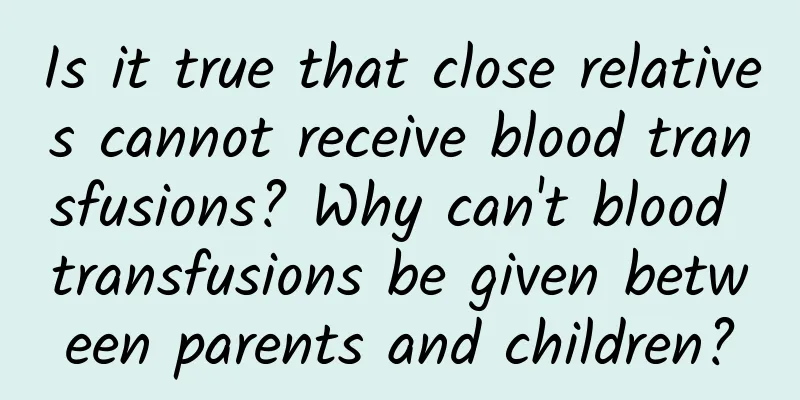Is it true that close relatives cannot receive blood transfusions? Why can't blood transfusions be given between parents and children?

|
In modern times, more serious diseases involve blood transfusions, but every time a family member wants to donate blood to a patient, the doctor will refuse. So is it true that close relatives cannot receive blood transfusions? Why can't parents and children receive blood transfusions? The following editor will explain them one by one, hoping to help everyone. Is it true that close relatives cannot receive blood transfusions?Blood transfusion is actually a type of transplant. Since it is a transplant, it is bound to be accompanied by a series of possible immune reactions, and transfusion-associated graft-versus-host disease (TA-GVHD) is one of these immune reactions. Transfusion-associated graft-versus-host disease is a serious condition, progresses rapidly, and has a high mortality rate. The probability of this disease occurring in non-relative blood recipients is very small, but the closer the blood relationship, the higher the probability of its occurrence. Therefore, if blood transfusions are performed between relatives, it may not save lives but kill them. However, if blood transfusions between close relatives are necessary, the lymphocytes in the blood must be killed before blood transfusion. Why can't blood be transfused between parents and children?Some people believe that it is safest for patients to use blood from relatives because of family ties, transfusion reactions are small, and relatives know each other well, so the risk of contracting diseases through transfusion is very low. To some extent, the risk of graft-versus-host disease (GVHD) after blood transfusion between relatives (such as parents and children) is much greater than the risk of blood transfusion between non-relatives. The mortality rate of GVHD is as high as 98%. When the composition of the patient's blood and the transfused blood is similar, the patient's immune function is defective or suppressed due to illness and other reasons, and lacks the ability to identify foreign substances. After the transfusion, the foreign blood is mistaken for its own blood and is not rejected. After the foreign blood enters the patient's body, the lymph node cells in the patient's blood are identified as non-self lymphocytes and rejected, resulting in fatal GVHD. Therefore, patients should avoid using relatives' blood for blood transfusion treatment. What are the possible side effects after blood transfusion?If blood is not handled properly during transportation, it can also cause hemolysis. This situation can be fatal. In addition to hemolysis, fever will also occur. This phenomenon is relatively common and can be solved well with immediate treatment. Allergic reactions should be what everyone has heard of more. Some are local rashes, measles, and some may even cause laryngeal edema. When allergies occur, blood transfusions should be stopped immediately and anti-allergic treatment should be actively performed. When severe laryngeal edema affects breathing, tracheotomy should be performed immediately to keep the airway unobstructed. The second is the transmission of diseases. We often see reports of hepatitis B and AIDS being transmitted due to blood transfusions. Such reports are relatively rare now. |
<<: Can AIDS be detected when donating blood? What diseases can be detected when donating blood?
>>: Which direction can't the head of the bed face? Why can't the head of the bed face west?
Recommend
Pelvic bone hyperplasia
Bone hyperplasia can occur in any bone in the bod...
Osteoporosis: a silent "bone fracture" crisis
With the aging of the population, osteoporosis ha...
Interesting Medicine Talk | Metformin (with audio)
Your browser does not support the audio tag...
What to do if you have a sore throat during pregnancy
What women worry about most after becoming pregna...
What is the ending of Zhuge Liang in Romance of the Three Kingdoms? How old is Zhuge Liang in Romance of the Three Kingdoms?
There are more than a thousand characters with na...
Does taking medicine before pregnancy have any effect on the fetus?
Taking medicine is a very common thing for ordina...
What to do if the areola turns dark
The darkening of the areola is something that man...
What does a fibroid look like?
Fibrosis is a tumor and also a disease that will ...
What does hemolysis mean for pregnant women with type O blood?
Pregnant women may experience hemolysis due to bl...
Is it better to eat rice or pasta? What is the difference between rice and pasta?
As we all know, rice and pasta are two common sta...
More than 20 reasons why women are sleepy
There used to be a very interesting question, tha...
Can I massage my breast if I have a lump?
If you massage a lump in your breast, you need to...
What to use for private parts
As women age, their private parts will gradually ...
Are dysmenorrhea patches useful?
Many female friends come to consult the editor, a...









